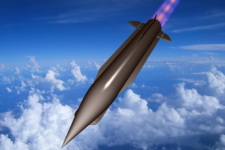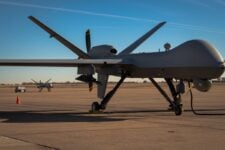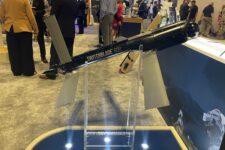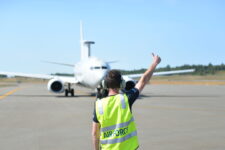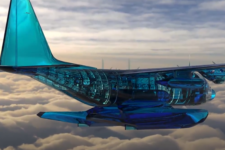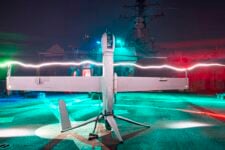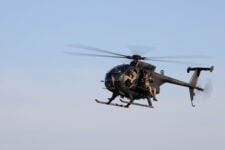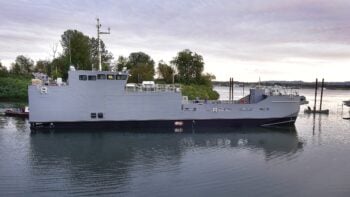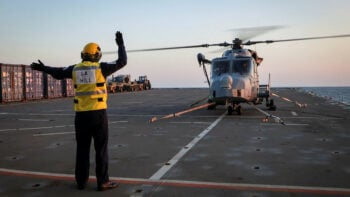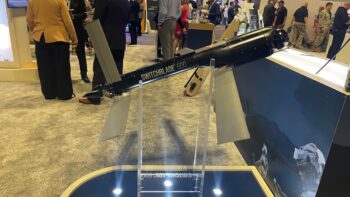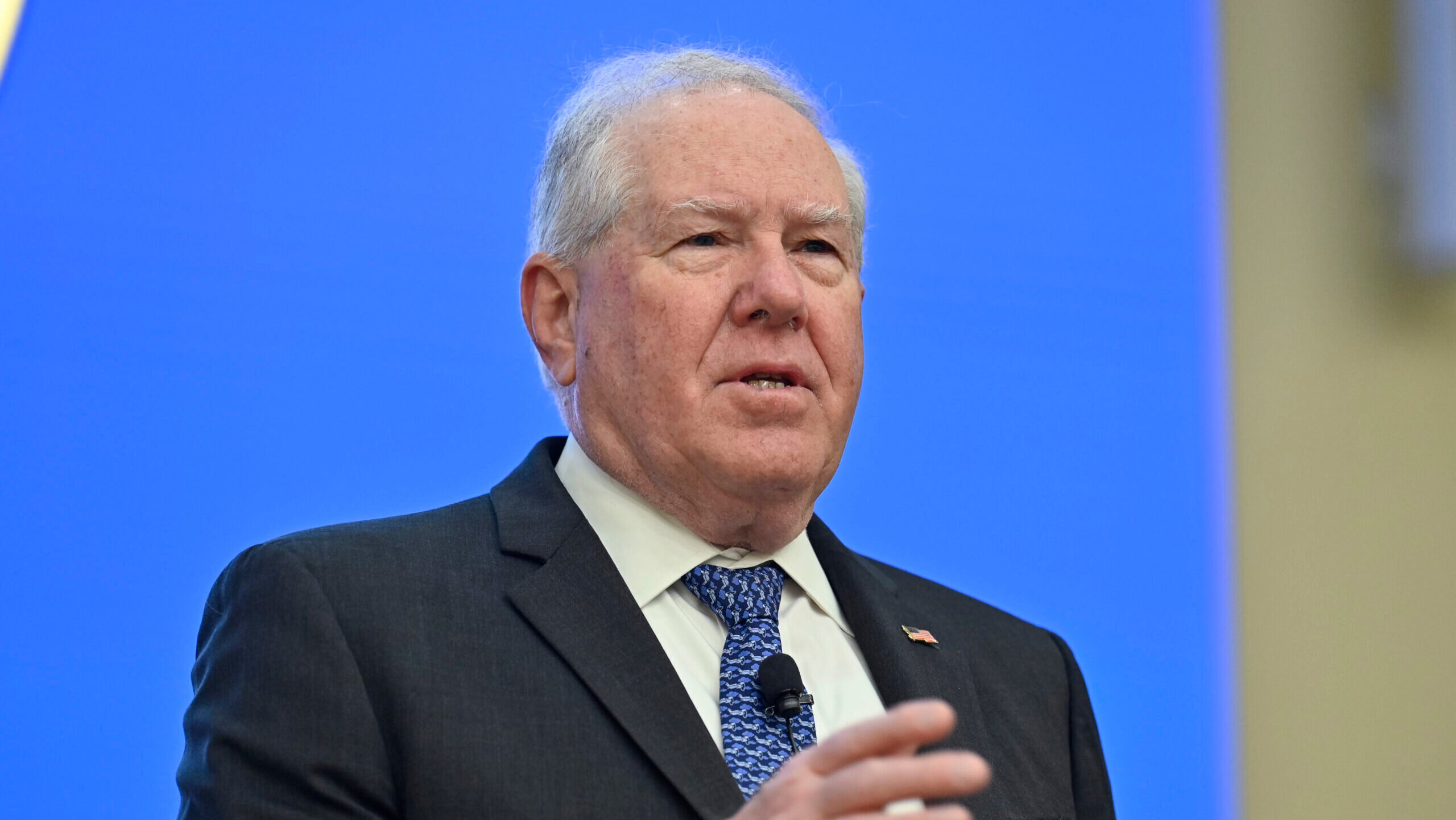
Secretary of the Air Force Frank Kendall speaks with students and guests during the Senior Leader Orientation Course at Joint Base Andrews, Md., Nov. 13, 2023. (U.S. Air Force photo by Eric Dietrich)
UPDATED 4/24/24 at 5:48 PM ET with details from an Air Force press release and comments from CCA vendors.
WASHINGTON — Defense startup Anduril and drone maker General Atomics Aeronautical Systems (GA-ASI) have been picked by the Air Force to build and test drone prototypes for the next phase of the service’s Collaborative Combat Aircraft program, the Air Force announced tonight.
The Air Force’s decision winnows down a pool of five competitors to two. As a result, three other vendors — Boeing, Lockheed Martin and Northrop Grumman — have been eliminated from the running.
“The companies not selected to build these production representative CCA vehicles, and execute the flight test program, will continue to be part of the broader industry partner vendor pool consisting of more than 20 companies to compete for future efforts, including future production contracts,” the Air Force said.
As Breaking Defense first reported, the five contractors were previously picked by the Air Force for the program’s first phase, which largely focused on design work. Today’s selection narrows down the vendors who will take their designs from the drawing board to the real world. As Air Force acquisition chief Andrew Hunter recently told lawmakers in a congressional hearing, the upcoming CCA stage will see those vendors “complete detailed designs, build prototypes and test production-representative test articles.”
Unveiled by the service as a major multibillion dollar program in the fiscal year 2024 budget, the CCA effort aims to initially field as many as 1,000 drones. According to the service’s press release today, officials plan to make a “competitive production decision” by FY26 for the first round of CCA work and “field a fully operational capability before the end of the decade.”
RELATED: In a ‘world first,’ DARPA project demonstrates AI dogfighting in a real jet
At the Air & Space Forces Association Warfare Symposium in February, Kendall revealed that the CCA competition underway right now would be the program’s first “increment,” with a second to follow in the FY25 budget. That second increment would provide vendors eliminated today, as well as new ones, another shot at a CCA contract. International collaboration could also feature in the second increment, Kendall said, and the service’s release today indicated foreign military sales could be on the table for the program.
During the February roundtable, Kendall further revealed the “possibility” that more than one vendor could see their drone bid enter service for the first increment. He also floated the chance of carrying up to three vendors through the preceding test phase if industry helped share some of the cost.
With only two vendors making the cut today, it’s unclear if that idea bore any fruit. Asked recently whether industry was convinced to pick up some of the tab, Hunter told reporters that “cost sharing is not core to our approach on CCA.”
The service’s press release today said that the down select decision “does not exclude any of the vendors from competing for the future Increment 1 production contract” — likely suggesting companies would have to spend internal funds to move their designs forward and compete for an eventual production deal.
What Companies Pitched, And What Comes Next
When it comes to specific designs, GA-ASI has stated that the company’s Gambit drone family would be its entry, while Anduril’s acquisition last year of autonomous aircraft vendor Blue Force positioned the Fury drone to be Anduril’s bid. In images today touting the company’s win, Anduril showcased the Fury drone, appearing to confirm the drone was the company’s bid.
“There is no time to waste on business as usual. With the CCA program, Secretary Kendall and the Air Force have embraced a fast-moving, forward-looking approach to field autonomous systems at speed and scale,” Anduril CEO and Co-Founder Brian Schimpf said in a statement. “We are honored to be selected for this unprecedented opportunity, which signals a demand for continued expansion of the defense industrial base. Anduril is proud to pave the way for other non-traditional defense companies to compete and deliver on large scale programs.”
“Throughout our 30-year history, GA-ASI has been at the forefront of rapidly advancing unmanned aircraft systems that support our warfighters,” GA-ASI President David Alexander said in a statement. “The USAF is moving forward with GA-ASI due to our focused commitment to unmanned air-to-air combat operations and unmatched UAS experience, ensuring the production of the CCA aircraft at scale to deliver affordable combat mass for the warfighter.”
Boeing said in a statement today that the aerospace giant offered a “proprietary solution tailored to the U.S. Air Force’s unique CCA phase one requirements,” and did not pitch the MQ-25 Stingray or MQ-28 Ghost Bat.
“While we are disappointed that we won’t be moving forward in this phase of the Air Force’s CCA program, we are undeterred in our commitment to providing next-generation autonomous combat aircraft for U.S. and global military customers. Work continues on our robust and growing autonomous family, including the MQ-25 Stingray and future derivatives, the MQ-28 Ghost Bat, and a number of proprietary programs we can’t disclose,” Boeing said.
Lockheed and Northrop have also not confirmed what candidates they put forward.
In a statement, Lockheed said the company “remains committed to advancing the state of the art in autonomous systems for air and ground missions. Our work to develop and integrate pathfinding open architectures, ground control systems like the Multi-Domain Combat System™, human factors interfaces, and mission systems continues. For some time, we’ve been focused on bringing to life the transformative power of autonomous and AI/ML enabled operations in crewed and uncrewed DoD systems, with particular focus on integrating CCA with F-35 and F-22. These commitments and work are ongoing.”
A representative for Northrop did not immediately respond to a request for comment.
A second parallel effort under CCA is also known to be working on the drones’ autonomous software, though it’s unclear what companies are involved. Hunter said last year the service already had 20 to 30 vendors working on that element of CCA work, and more recently said in February that the autonomy piece would continue independent of progress on the hardware side.
TAI exec claims 20 Turkish KAAN fighters to be delivered in 2028
Temel Kotil, TAI’s general manager, claimed that the domestically-produced Turkish jet will outperform the F-35 Joint Strike Fighter.


